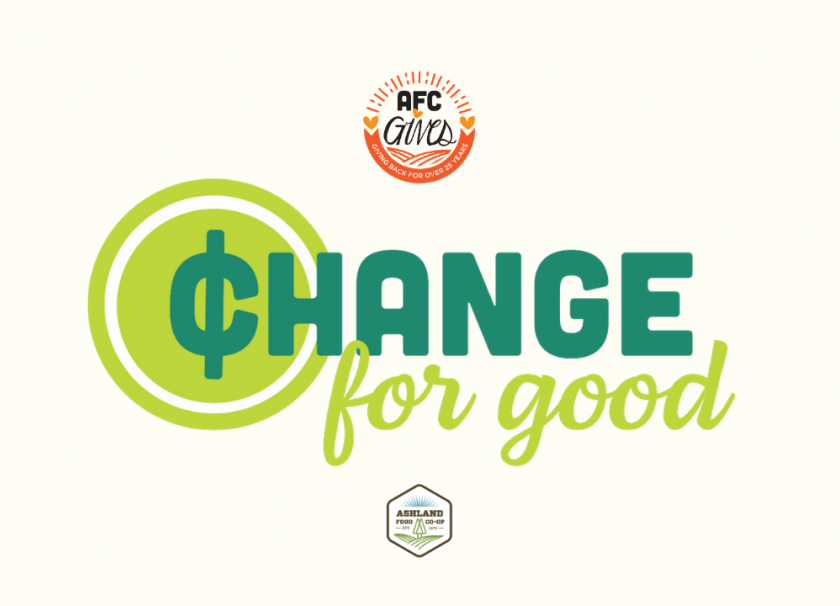Choose To Reuse
by Rianna Koppel, Co-op Sustainability Coordinator
At the Ashland Food Co-op, we are committed to becoming Zero Waste by 2030. Along the way, we’ve learned a lot about packaging and single-use at our store. Our owners care deeply about reducing plastic waste, and we do too!
Reusable Bags
At the co-op, we have many different bag options… So what's the best choice?
We offer plastic bags, paper bags, and reusable bags. There is a 2¢ charge for new plastic bags, and a 10¢ charge for new paper bags. These charges help to subsidize the costs of our reusable bags.
We offer two reusable options, both costing only 50¢! Our plastic bag is made from reused and recycled plastic. Our fabric bag is made from cotton by the company Royal Jute. 100% of the proceeds from Royal Jute go directly to Kiva, a nonprofit that finances micro-lending programs for women across the world. Every time you purchase or use one of these bags, it makes a real impact for the planet and people.
Since we introduced reusable bags in fall of 2018, we have sold over 16,000 of them to our awesome and very sustainable members. This has worked to reduce plastic too - we have ordered 100,000 less plastic produce bags than in 2018.
What About Compostable Bags?
Sometimes people ask, why don’t you use compostable bags like other grocery stores? This is a great question, with a complex answer.
There are many commercially compostable items out there - including our very own Co-op take-out containers. If you start reading the tiny font on various packaging, you will see that there are many packaged items that are compostable in industrial or commercial facilities.
Here’s the problem: we don’t have any industrial composting facilities in the state of Oregon that will take these kinds of materials.
In fact, every composting facility in Oregon came together to issue a statement on their refusal. They called it, “A Message From Composters Serving Oregon: Why We Don’t Want Compostable Packaging and Serviceware”. The company listed out nine reasons why it’s not a good idea, including the facts that these materials do not always break down, they introduce contaminants, and they cannot sell this compost to organic farmers.
You can read more about this statement in this NCRA article from March 2019.
What about straws made from avocado pits?
So what about bio-based products made from renewable materials like bamboo, corn, or avocado pits? No matter the material, it’s still a single-use straw. There is a financial impact as well - straws made from avocado pits costs a whopping 600% more than a single-use paper straw. I suggest trying a reusable stainless steel straw instead!
There’s another hidden cost to plastics made from materials like corn… the impact on the environment.
According to the Oregon Department of Environmental Quality’s study on Popular Packaging Attributes, bio-based disposables can actually have a worse environmental impact! They concluded that biobased packaging materials have significant environmental trade-offs when compared to non-bio based counterparts. Plus, they take away from food production.
What Can I Do?
Choose to reuse first. Make sure to throw your reusable produce bags in with your tote bags, and don’t forget your coffee cup! Eat in at the Co-op on a durable plate or bowl - which will save you 15¢.
There are different ways to address our plastic problems, and each one of them can start with us making the choice to reuse. We started our 15¢ discount for bringing your own coffee cup in 2013 - since then, customers have used this discount over 113,000 times! That’s an amazing diversion from the landfill that makes us proud to be committed towards zero-waste at the Co-op.
If you would like to learn more about our sustainability initiatives, contact Rianna at sustainability@ashlandfood.coop.
More Co-op News

August Change for Good Partner: Community Works
August's Change for Good Partner is

November Change for Good Partner: Southern Oregon Climate Action Now
November Change for Good Partner: Southern Oregon Climate Action Now
November's Change for Good Partner is

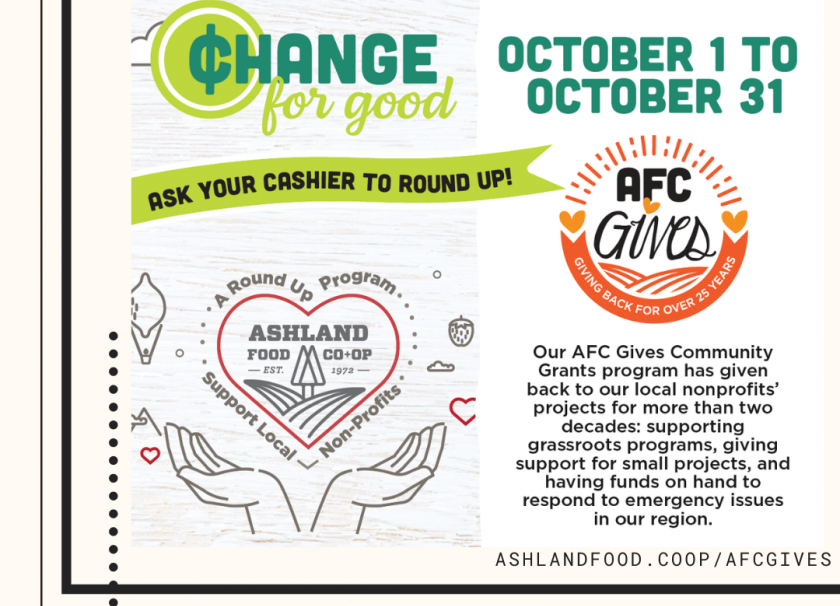
October Change for Good Partner: AFC Gives Community Fund
October's Change for Good Partner is
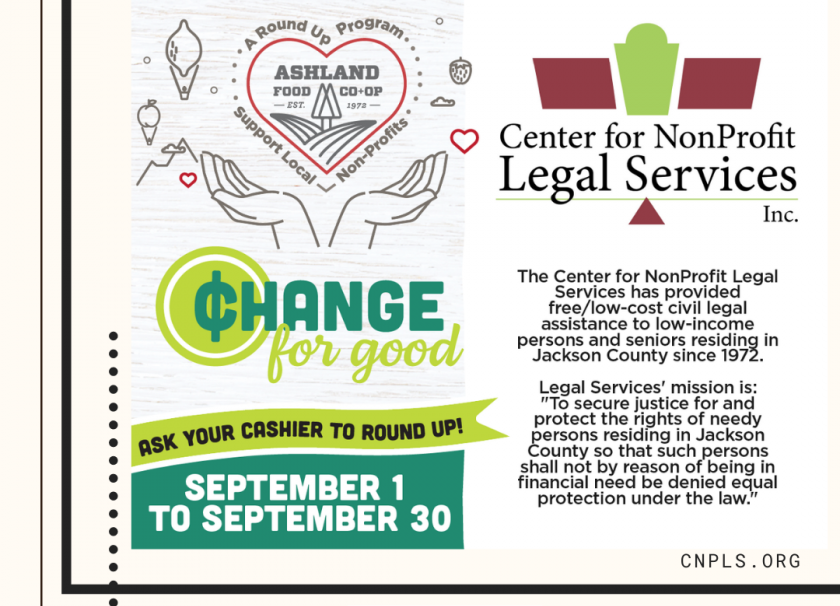
September Change for Good Partner: Center for NonProfit Legal Services
September's Change for Good Partner is
Center for NonProfit Legal Services
The Center for NonProfit Legal Services has provided free/low-cost civil legal assistance to low-income persons and seniors residing in Jackson County since 1972.
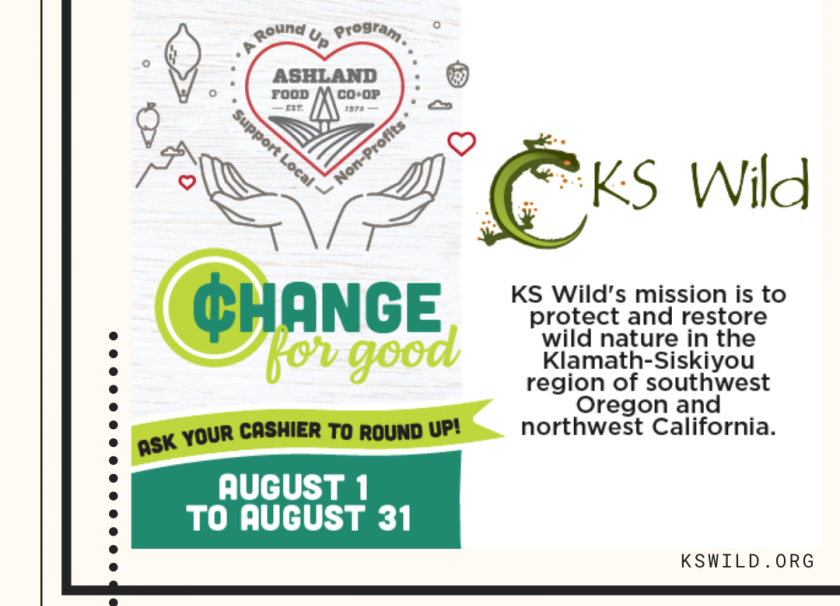
August Change for Good Partner: Klamath-Siskiyou Wildlands Center
August's Change for Good Partner is
Klamath-Siskiyou Wildlands Center
(KS Wild)
KS Wild's mission is to protect and restore wild nature in the Klamath-Siskiyou region of southwest Oregon and northwest California.

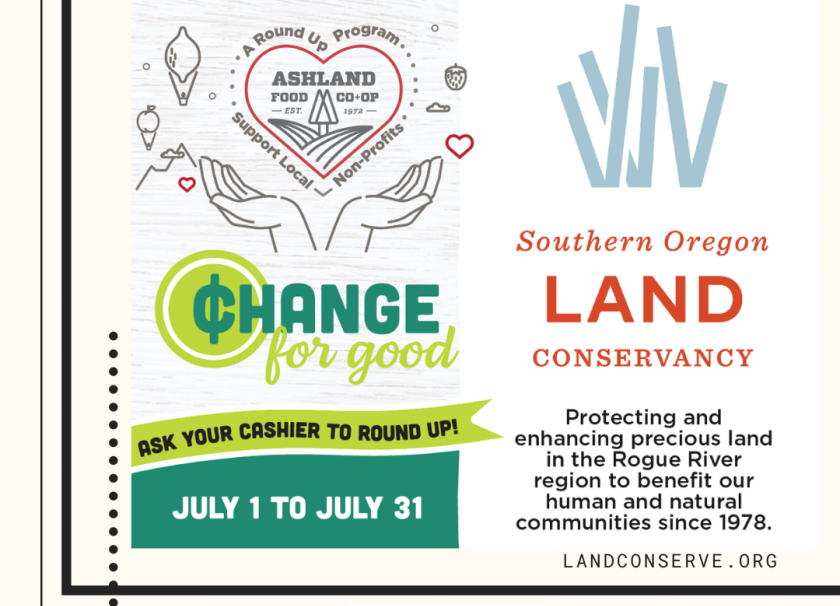
July Change for Good Partner: Southern Oregon Land Conservancy
July's Change for Good Partner is
Southern Oregon Land Conservancy
Protecting and enhancing precious land in the Rogue River region
to benefit our human and natural communities since 1978
Meet the 1st Street Beet
Welcome to the newly redesigned and reimagined newsletter from the Ashland Food Co-op: 1st Street Beet.
Think of this publication as a resource to know what’s going on in every level of the community: at the co-op, around town, in the region, and on Earth!
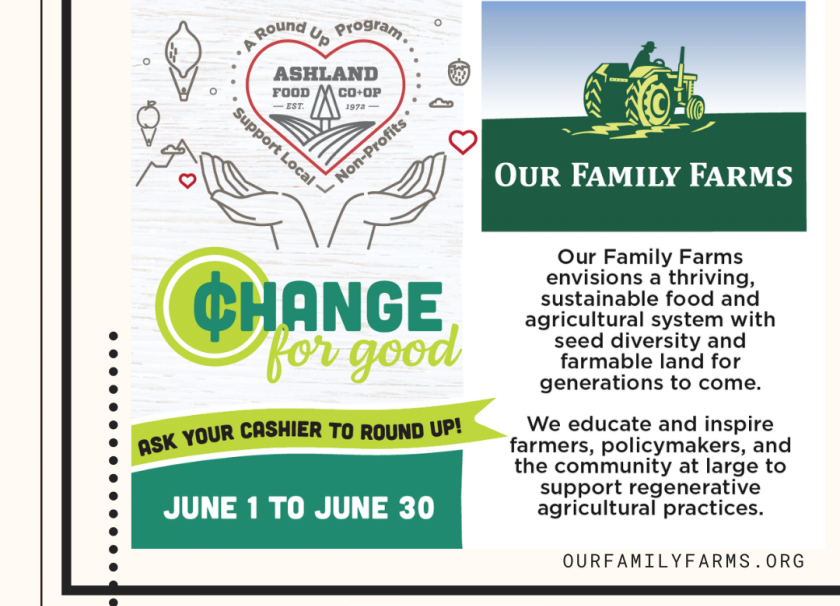
June Change for Good Recipient: Our Family Farms
June's Change for Good Recipient is
Our Family Farms, an Oregon 501(c)3 non profit organization, is hard at work educating and inspiring farmers, policy makers and the community at large to support regenerative agricultural practices.

Capiche Conversations: Interview with Tracy Kaiser, Marketing & Education Manager of Ashland Food Co-op
Our own marketing manager, Tracy Kaiser, was interviewed by Melissa L. Michaels for Capiche Conversations.
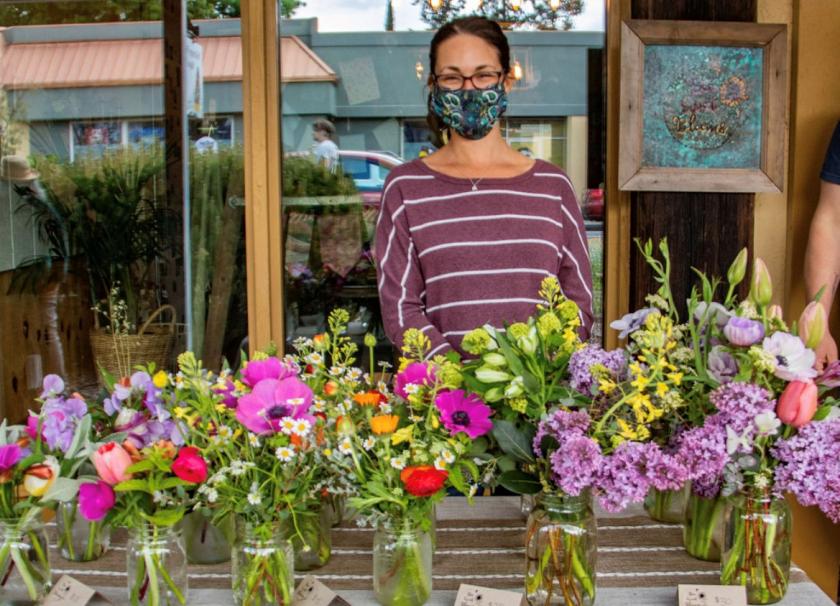
May Day Community Block Party
Photography by Chelsea Whitney Art
On May 1st, several Southern Oregon businesses came together for a block party to provide a space to gather as a community after a rough spell due to the pandemic and fires. The May Day Block Party was hosted on Main St in Phoenix, where the scent of food trucks mingled with artisan goods such as local cheeses, locally farmed flowers, and even fresh-baked pastries.
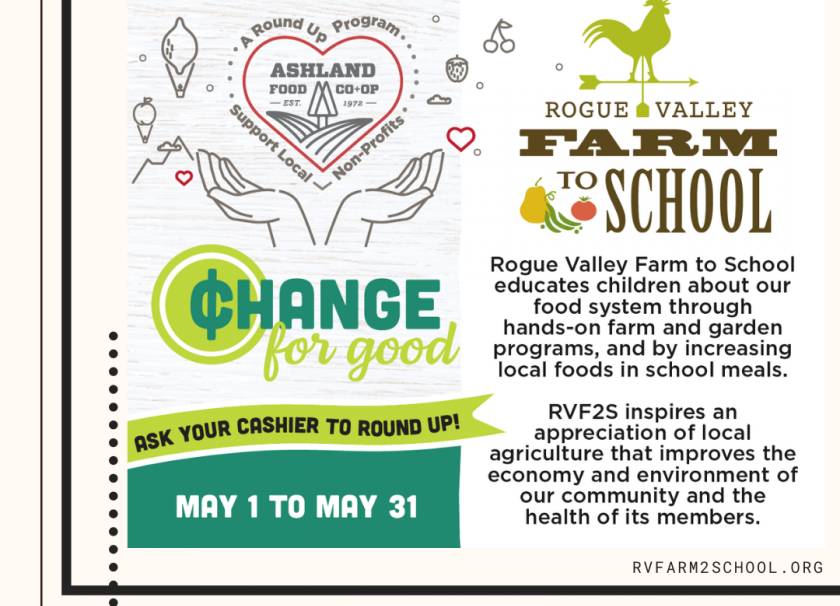
May Change for Good Recipient: Rogue Valley Farm to School
May's Change for Good Recipient is
Rogue Valley Farm to School educates children about our food system through hands-on farm and garden programs, and by increasing local foods in school meals.
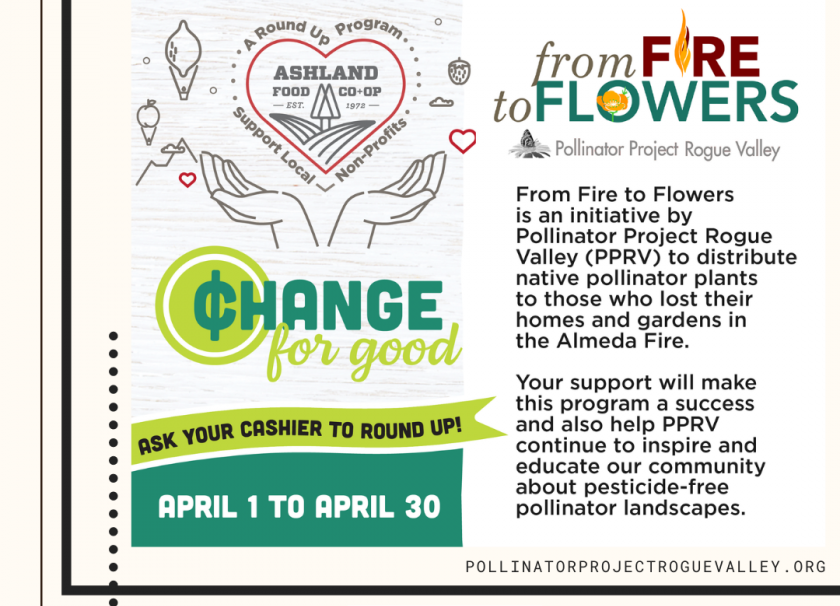
April Change for Good Recipient: Pollinator Project Rogue Valley
April's Change for Good Recipient is
